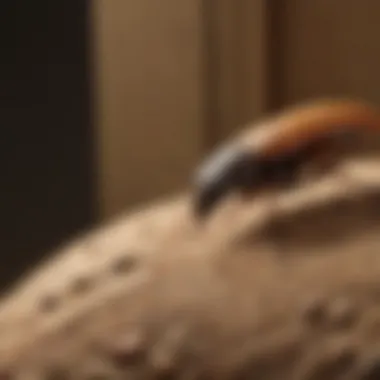Understanding McCloud Services in Pest Management


Intro
In today's world, effective pest management is essential for maintaining a comfortable living environment. As pest control needs evolve, understanding the services offered by McCloud Services becomes increasingly important. This company stands out due to its innovative approaches and comprehensive strategies, particularly in termite management.
By diving into their methodologies, technology, and case studies, homeowners and pest control professionals can find valuable insights that will aid in decision-making. A focus on understanding pest identification, prevention strategies, and treatment options will contribute to a clearer view of McCloud Services' impact on pest management.
Pest Identification
Identifying pests accurately is the first step in effective pest management. It allows for a targeted approach in both prevention and treatment. Common pests that often affect households include:
- Termites: Known for causing structural damage, termites thrive in warm, humid environments. They are often identified by the presence of discarded wings and mud tubes.
- Ants: Various species can invade homes, creating trails. Signs of ant infestations include small mounds of dirt and foraging ants.
- Rodents: Mice and rats are notorious for entering homes, leaving droppings as a clear sign of their presence.
- Bed Bugs: These pests feed on blood and are often found in bedding. Small red marks on the skin can be indicators of an infestation.
Once a pest is identified, recognizing the signs of an infestation becomes critical. For example, a termite issue may be suggested by softwood, darkening areas, or a hollow sound when tapped.
Prevention Strategies
Prevention is always better than cure. Simple home maintenance practices can help keep pests at bay. Consider these strategies:
- Seal Cracks and Gaps: Thoroughly inspect your home, including windows, doors, and foundations.
- Proper Waste Disposal: Keep garbage cans tightly sealed and regularly take out the trash.
- Regular Cleaning: Maintain a clean environment to prevent attracting pests with food particles or clutter.
Natural deterrents can also be effective:
- Essential Oils: Some oils, like peppermint or tea tree, can repel various pests.
- Vinegar Solutions: A mixture of vinegar and water can deter ants and spiders.
- Barrier Methods: Installing screens on windows and doors can prevent pests from entering.
Treatment Options
When infestations occur, both chemical and natural treatment options are available. It's crucial to choose the right approach:
- Chemical Treatments: These often provide quick results. Products like Termidor for termites have proven effective. However, care must be taken to follow guidelines for safety.
- Natural Treatments: Diatomaceous earth or boric acid are alternative options for pest control without harmful chemicals. These methods may take longer but may be safer for families and pets.
For those who prefer DIY treatments, a step-by-step guide can help:
- Identify the Pest: Understand what you are dealing with.
- Choose Your Treatment: Based on identification, select the appropriate treatment method or product.
- Apply Carefully: Follow the instructions on the product for effective use.
- Monitor Results: Check back after a few days to ensure effectiveness.
Effective pest management involves understanding pests, preventing infestations, and knowing how to treat them. Knowledge is powerful.
By comprehensively assessing these aspects of pest management, McCloud Services emerges as a crucial player in shaping the future of pest control solutions for homeowners and pest professionals alike.
Preface to McCloud Services
McCloud Services is a significant provider in the pest management sector, recognized for its comprehensive approach to pest control. This section highlights the importance of understanding the role of such services within the broader context of pest management. As households become increasingly aware of the implications of pest infestations, professional services like those offered by McCloud can make a notable difference. Homeowners often seek effective solutions that go beyond DIY methods, and that is where McCloud Services excels. The following subsections will offer a deeper dive into the types of pest management services available and the critical nature of utilizing professionals in ensuring a pest-free environment.
Overview of Pest Management Services
Pest management encompasses a wide array of services designed to control and eliminate pests. The services range from preventative measures to advanced techniques aimed at controlling specific pests. McCloud Services, in particular, focuses on a detailed assessment of the pest problem before identifying the appropriate intervention. Typical offerings include:
- Inspection and Assessment: Initial evaluations to determine type and extent of the infestation.
- Treatment Plans: Customized strategies tailored to specific pest issues. This includes the careful selection of pesticides and organic alternatives.
- Monitoring and Follow-Up: Ongoing surveillance to prevent future infestations.
- Education: Providing homeowners with valuable knowledge on pest behavior and prevention techniques.
Understanding these services helps homeowners identify their specific needs and realize the importance of professional intervention in maintaining a healthy living environment.
The Importance of Professional Pest Control
Professional pest control is essential for several reasons. First, trained technicians possess the skills and knowledge to accurately diagnose pest-related issues. They are familiar with various pest behaviors and life cycles, which is crucial for effective management. Second, the use of inappropriate methods or products can jeopardize health. Professionals like those at McCloud understand how to apply treatments safely, reducing risks to people and pets.
Moreover, pest control can be a complex endeavor that requires a systematic approach. Regular services ensure proactive measures are taken before infestations escalate.
"Preventing pests today is easier than eliminating them after they infest."
History of McCloud Services
The history of McCloud Services is significant for understanding its evolution in the pest management field. This section outlines the key milestones that have shaped the company's growth and how these developments have influenced their current service offerings. A thorough grasp of the history provides context for the innovative approaches and methodologies McCloud Services employs in modern pest control.
Founding and Initial Growth


McCloud Services was founded several decades ago with a mission to provide effective pest control solutions. The founders recognized a gap in the market for reliable and professional pest management. Their goal was to address pest issues in a way that was both effective and educational for customers. Early on, the company focused on local markets, developing a loyal customer base through excellent service and community engagement.
Key aspects of their initial growth included:
- Community Trust: Building relationships with homeowners and business owners established credibility.
- Effective Methods: They employed a mix of traditional techniques and early integrated pest management practices that considered environmental impact.
- Training and Education: McCloud Services invested in employee training, ensuring that staff were knowledgeable about pest biology and control methods, which set them apart from competitors.
By the late '90s, McCloud Services expanded its reach, introducing new service lines and venturing into commercial pest management. This laid the groundwork for their diverse offerings we see today.
Evolution of Services Offered
As the pest management landscape changed, so did McCloud Services. The evolution of their services reflects the growing understanding of pest control needs. This adaptation has been crucial in retaining customer relevance and addressing contemporary concerns regarding pests—especially termites.
Some critical developments in service offerings include:
- Expansion into Integrated Pest Management (IPM): Recognizing the need for environmentally sound practices, McCloud Services embraced IPM approaches. This includes assessment of pest risks and the use of the least toxic methods available.
- Technological Integration: In response to an increasingly data-driven world, the company invested in new technologies for pest monitoring and treatment. This allowed for precise intervention, thus improving outcomes for clients.
- Specialized Termite Control Programs: With termite infestations posing significant risks to property, tailored strategies were developed. These include comprehensive site assessments, ongoing inspections, and targeted treatment plans to ensure long-term effectiveness.
Overall, the historical journey of McCloud Services showcases a commitment to innovation and customer education. Their approach not only addresses immediate pest problems but also fosters a deeper understanding of pest management among clients. This historical foundation remains crucial as the company navigates the future of pest control and meets evolving consumer expectations.
Types of Services Offered
In this section, we will explore the various services provided by McCloud Services. Understanding these services is crucial as they represent the spectrum of solutions available to both residential and commercial clients in pest management. Each service targets specific pest-related issues, and the effectiveness of these services directly impacts the health and safety of our living and working spaces.
Residential and Commercial Pest Control
McCloud Services offers tailored pest control solutions for residential and commercial properties. This service is vital as it recognizes that pests can affect these two environments differently. In residential settings, the focus is often on common household pests such as ants, roaches, and rodents. For commercial establishments, the emphasis may shift towards industry-specific pests that can cause operational disruptions or harm a company’s reputation.
Effective pest control strategies for residential areas include regular inspections, preventive treatments, and prompt responses to identified infestations. In contrast, commercial pest management often incorporates ongoing monitoring and compliance with health regulations, ensuring that businesses remain pest-free while adhering to safety standards.
Termite Control Strategies
Termites present a unique challenge and can cause significant damage if not managed effectively. McCloud Services employs several targeted strategies to combat termite infestations. One prominent approach is the use of baiting systems and liquid treatments, which are designed to eliminate termites at the source.
Understanding the behavioral patterns of termites is essential in developing successful treatment plans. Homeowners and property managers benefit from thorough inspections and preventative measures, which can save money and prevent extensive damage.
"Proactive termite management not only protects your investment but also adds peace of mind."
Integrated Pest Management Techniques
Integrated Pest Management (IPM) is another cornerstone of McCloud’s approach to pest control. This methodology emphasizes a comprehensive understanding of the pest ecosystem, allowing for sustainable and effective management strategies. It combines biological, cultural, physical, and chemical control methods to minimize the impact on the environment.
For homeowners, this means utilizing non-toxic remedies whenever possible, which aligns with the increasing demand for eco-friendly solutions. Simple actions like removing standing water and sealing entry points are part of IPM’s cultural practices. Moreover, educating clients about pest prevention further enhances the effectiveness of these integrated strategies, creating a more comprehensive solution to pest control.
In summary, understanding the types of services offered by McCloud Services enables homeowners and organizations to choose the right management solutions that cater specifically to their needs. The combination of residential and commercial pest control, targeted termite strategies, and integrated pest management forms a robust framework that addresses pest issues efficiently.
Technological Innovations in Pest Control
In the realm of pest management, the integration of technology has become increasingly pivotal. McCloud Services exemplifies how technological innovations can enhance pest control effectiveness and efficiency. This section discusses the importance of these advancements, emphasizing their specific elements, benefits, and considerations that shape modern pest management strategies.
Use of Data Analytics
Data analytics plays a crucial role in transforming pest control practices. By leveraging data, McCloud Services can analyze trends and patterns in pest behavior. This information aids in predicting infestations and helps in devising tailored treatment plans.
- Enhanced Decision Making: Data collected from previous infestations can guide pest control professionals on which methods are most effective in specific cases.
- Cost Efficiency: Analyzing data allows for a more targeted approach, minimizing unnecessary treatments and better allocation of resources.
- Real-Time Monitoring: Continuous data analysis supports real-time tracking of pest populations, enabling proactive measures instead of reactive ones.
These aspects contribute significantly to more informed and strategic pest management.
Smart Solutions for Monitoring Pests
Advancements in smart technology have paved the way for innovative pest monitoring systems. McCloud Services employs various smart solutions to monitor pest activity effectively.
- IoT Devices: Internet of Things (IoT) devices collect data from various locations, transmitting real-time information about pest activity. This technology allows for immediate response to potential threats.
- Remote Sensing Technologies: These tools detect pests in their early stages, which is essential for timely intervention. Early detection often leads to easier and less costly treatments.
- Mobile Applications: Customized apps provide homeowners and pest professionals with alerts about pest sightings, treatment schedules, and general pest management tips.
Eco-Friendly Pest Control Options
The importance of eco-friendly pest control options cannot be overstated in today’s environmentally conscious world. Homeowners and pest control professionals alike now prioritize solutions that are not only effective but also safe for the environment. Adopting eco-friendly methods minimizes the risks associated with traditional chemical treatments, which can pose health hazards and cause environmental degradation. This section explores two critical aspects of eco-friendly pest control: natural remedies and sustainability in pest management.


Natural Remedies and Their Effectiveness
Natural remedies for pest control serve as an appealing alternative to chemical pesticides. Many homeowners are turning to these options for their safety and efficacy. Common natural ingredients, such as diatomaceous earth, essential oils like peppermint and tea tree, and vinegar, can be effective in repelling or eliminating pests.
Effectiveness of Natural Remedies:
- Targeted Action: Natural ingredients usually target specific pests without affecting beneficial organisms. For instance, neem oil is known to disrupt insect life cycles while being safe for plants and people.
- Low Toxicity: Most natural remedies are non-toxic, reducing health risks for families and pets.
- Ease of Use: Many natural solutions are easy to prepare at home. This empowerment fosters involvement from homeowners in pest management.
However, while natural remedies can be effective, it is essential to consider a few limitations:
- Time-Consuming: Natural solutions may require more frequent application.
- Variable Efficacy: The effectiveness may vary based on the pest species or the severity of the infestation.
Sustainability in Pest Management
Sustainability in pest management goes beyond just choosing natural products. It encompasses a holistic approach to pest control that considers the broader impact of pest management practices on the environment, economy, and society.
Key Principles of Sustainable Pest Management:
- Integrated Pest Management (IPM): This strategy combines biological, cultural, physical, and chemical tools in a way that minimizes economic, health, and environmental risks. For example, introducing beneficial insects can naturally control pest populations without chemical intervention.
- Education and Awareness: Educating homeowners about the life cycles of pests and environmental impact encourages the adoption of sustainable practices. Informing them of pest prevention methods can lead to a long-term reduction in pest problems.
- Eco-Friendly Product Selection: Certified sustainable products ensure that chemicals used have the least environmental impact. When selecting pest control products, looking for efficiency as well as reduced toxicity is vital.
In summary, eco-friendly pest control options are increasingly becoming a cornerstone of pest management practices. Through the use of natural remedies and sustainable techniques, homeowners can support a healthier home environment while protecting the ecosystem.
Case Studies of Successful Interventions
Understanding the effectiveness of pest management strategies often benefits from real-world examples. Case studies of successful interventions provide insights into how pest control companies like McCloud Services tackle challenges in diverse situations. These narratives not only demonstrate the effectiveness of their techniques but also underscore the importance of tailored approaches to pest management. For homeowners, learning from past successes offers a roadmap for making informed decisions. The lessons drawn from each case help to demystify the processes involved in pest control and highlight best practices.
Residential Case Studies
In residential settings, pest control is typically more personal and immediate. McCloud Services has documented numerous interventions that showcase their expertise. One notable case involves a family in suburban Ohio facing a persistent termite infestation. The situation was dire. The structural integrity of their home was at risk.
McCloud Services initiated a comprehensive assessment, revealing the extent of the infestation and identifying the various entry points. They employed a multifaceted approach, combining liquid treatment with baiting systems. Over a span of several months, the infestation was eradicated, and the family reported a significant decrease in termite activity and peace of mind.
Such residential case studies illustrate the importance of acting swiftly and effectively. They reinforce how professional intervention can lead to a healthier home environment, ultimately preserving property value. Here are key takeaways from this case:
- Assessment is crucial: A thorough evaluation allows for a targeted treatment plan.
- Combining methods: Utilizing multiple strategies increases the chance of success.
- Ongoing monitoring: Regular follow-ups ensure long-term effectiveness of treatments.
Commercial Success Stories
Commercial properties often face larger challenges due to scale and potential impact on business operations. McCloud Services has successfully managed pest issues for various businesses, including restaurants and warehouses. One such case involved a prominent restaurant chain plagued by cockroaches, which threatened not only their reputation but also compliance with health regulations.
The restaurant called McCloud Services for immediate help. Technicians conducted detailed inspections, pinpointing hiding spots within the kitchen and dining areas. The team implemented a combination of traps, applications of gel bait, and thorough sanitation measures. Their proactive stance led to a rapid decline in pest activity. The restaurant was able to maintain its high standards and continue serving customers without disruptions.
The available metrics post-intervention illustrated the profound impact:
- Reduction in pest sightings: A 90% decrease within weeks.
- Customer satisfaction: Positive feedback increased following the intervention.
- Compliance achieved: Passing health inspections with zero violations.
These commercial success stories from McCloud Services reflect not only their effective methodologies but also the importance of timely, professional pest management in protecting business interests. Learning from these examples can help both businesses and homeowners in understanding the potential benefits of working with a professional pest control service.
Regulatory Compliance and Standards
Regulatory compliance and standards form the backbone of any pest management strategy, ensuring that services offered by McCloud Services align with legal and ethical considerations. These compliances are not merely bureaucratic hurdles; they provide essential safeguards for both the consumer and the environment, setting the stage for effective pest control while prioritizing safety.
Benefits of Compliance
Compliance ensures that pest management practices follow guidelines set by local and national authorities. These regulations aim to protect public health, safety, and the environment from potential harm caused by pest control substances. Thus, adhering to these standards affirms McCloud Services' commitment to responsible pest management. By ensuring that their methods abide by legal frameworks, McCloud Services enhances consumer confidence in their offerings.
Considerations for Compliance
The pest control industry faces significant scrutiny. Compliance requirements vary depending on the location and the specific service rendered. For homeowners, understanding these regulations can lead to better-informed decisions when hiring pest control services. Additionally, these standards can mandate the use of pest control products that are proven safe, thereby minimizing risks associated with exposure.
Understanding Legal Requirements
Understanding legal requirements is crucial for any pest control operator, including McCloud Services. The laws governing pest management cover everything from the types of pesticides that can be used to the certifications required for technicians. Each state or locality may have unique mandates, often influenced by the specific pest challenges their populations face.
Here are some elements that define legal requirements in pest management:
- Licensing: Technicians must possess valid licenses that indicate they are educated and capable of applying pest control methods safely.
- Product Registrations: All pest control substances used must be registered with the Environmental Protection Agency (EPA) and be approved for use.
- Reporting Obligations: Businesses must maintain detailed records of the services provided, including products used and their disposal methods.


"Licensing and registration ensure that only trained professionals handle pest control substances, protecting both the environment and public health."
Safety Protocols for Service Delivery
Implementing safety protocols is vital for the service delivery of pest management. McCloud Services emphasizes safety not just for their team but also for clients and the surrounding community. Following rigorous safety standards helps in preventing accidents and exposure to hazardous materials.
Key components of safety protocols include:
- Protective Gear: Technicians are required to wear appropriate personal protective equipment (PPE) to safeguard against exposure to chemicals.
- Training: Regular training ensures that staff are knowledgeable about the latest safety procedures and product applications.
- Emergency Response Plans: Having a detailed plan in case of an accident is a must. This includes procedures on how to handle spills or accidental exposures.
By adhering to these protocols, McCloud Services not only complies with regulations but also reinforces their reputation as a trustworthy provider of pest management solutions.
Customer Education and Resources
Customer education is an essential aspect of pest management. It empowers homeowners and renters with the knowledge they need to tackle pest issues effectively. Understanding how McCloud Services designs their educational approach provides insights into their commitment to a transparent pest control process. This section explores the resources and programs available for clients, enhancing their ability to identify, manage, and prevent pest problems in their homes.
Informational Guides Available
McCloud Services offers a variety of informational guides that are designed to educate clients about pest management. These guides cover several topics including common pests, treatment options, and preventive measures. The information is presented in a clear and easily understandable format, making it accessible to all.
Key benefits of these guides include:
- Awareness: Homeowners can learn about pests commonly found in their areas, like termites and rodents.
- Prevention Tips: The guides provide practical advice on how to minimize pest entry points and reduce infestations.
- Treatment Insights: Customers gain knowledge on how various treatments work, enabling them to make informed decisions.
Having a solid grasp of pest behavior and control methods allows clients to work alongside professionals in choosing the best strategies for their specific situations.
Workshops and Training Sessions
In addition to written materials, McCloud Services organizes workshops and training sessions for both homeowners and rental property managers. These sessions focus on pest identification, the significance of early intervention, and effective control strategies.
Benefits of attending these workshops include:
- Hands-On Experience: Participants can see first-hand how pest inspections are conducted and what signs to look for.
- Direct Interaction: Clients can ask questions and receive tailored advice from experienced pest management professionals.
- Networking: These workshops also provide a platform for homeowners to share experiences and learn from one another.
Through these educational initiatives, McCloud Services reinforces their mission to not just provide pest control, but to also empower clients with the knowledge to maintain a pest-free environment.
"Knowledge is the first step to effective pest management. When customers are educated, they play a crucial role in prevention and treatment."
Challenges in Pest Control Service Delivery
The pest control industry faces a range of challenges that can complicate service delivery. A thorough understanding of these challenges is vital for both pest control professionals and consumers, particularly for homeowners looking for effective solutions. By identifying these obstacles, strategies can be developed to overcome them, enhancing the overall efficiency and effectiveness of pest management solutions.
One major challenge is resistance to treatments. This phenomenon occurs when common pest control methods no longer work effectively due to pests adapting to certain chemicals or strategies. As a result, pesticides that were once effective may become less so, causing frustration for service providers and clients alike. This resistance varies by species and region, making it necessary for pest control services to utilize a multi-faceted approach. Homeowners might notice recurring infestations, which could result in increased costs and ineffective treatments. Understanding this concept can lead to discussions about the need for integrated pest management techniques that account for evolving pest behavior.
Another significant challenge involves market competition and industry trends. The pest control market is quite saturated, with many players competing for the same pool of clients. This competition can drive prices down, prompting some companies to cut corners in service quality. For consumers, this means the necessity of due diligence to ensure they select a responsible and effective pest control service. Furthermore, consumer preferences are changing—homeowners are increasingly interested in eco-friendly pest control options. McCloud Services, along with others, must adapt to these market shifts by blending traditional methods with innovative solutions that cater to environmentally conscious clients. Keeping up with the latest trends will be crucial for maintaining market position and providing top-notch service.
"Awareness of challenges in pest control can empower consumers to seek better solutions and advocate for service quality."
Future Trends in Pest Management
Understanding the future trends in pest management is essential for homeowners and homeowners alike. As we look ahead, we will find that pest control is evolving rapidly. This change is based on technology, consumer preferences, and environmental concerns. The future trends offer both opportunities and challenges for families trying to keep their spaces safe and comfortable.
Emerging Technologies
Emerging technologies are key to advancing pest management strategies. Companies, like McCloud Services, are investing in sophisticated tools to optimize pest control measures. These technologies include data analytics, IoT devices, and artificial intelligence.
- Data Analytics enables pest control professionals to identify patterns. This can help predict pest outbreaks before they become a larger issue.
- IoT Devices allow for real-time monitoring. Sensors placed in and around homes can detect pest presence, reducing response time.
- Artificial Intelligence aids in creating targeted treatment plans. AI can analyze various factors like pest species and environment conditions.
Implementing these technologies provides an edge. It not only improves efficiency but also enhances effectiveness. The result is a more proactive approach to pest management.
Changing Consumer Expectations
As society advances, consumer expectations in pest management also shift. Nowadays, families are not just looking for effective solutions. They desire services that are eco-friendly and tailored to their needs.
- Eco-Friendly Solutions: Today's consumers prioritize sustainability. They often question the safety of chemicals used in pest control. Homeowners prefer options that minimize environmental impact.
- Customization: Each home has different pest issues. Clients expect tailored solutions for their unique circumstances.
Not meeting these expectations can lead to dissatisfaction. Companies must adapt their practices to stay competitive. In this regard, education and clear communication are vital. Informing customers about methods, safety, and effectiveness builds trust.
"In the future, pest management will combine technology with customer care to offer tailored, sustainable solutions."
In summary, the future of pest management will likely be characterized by technology and consumer-focused solutions. McCloud Services exemplifies the shift toward these trends, reflecting the demands of our modern world.



